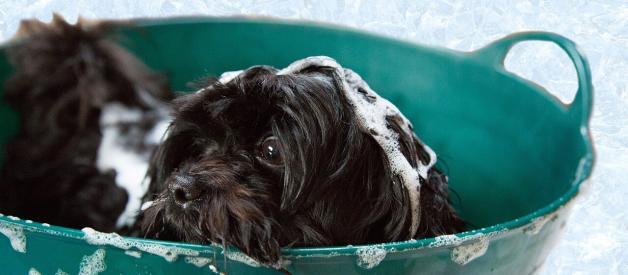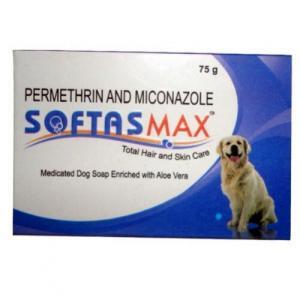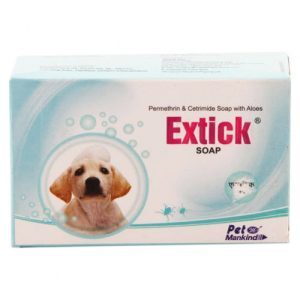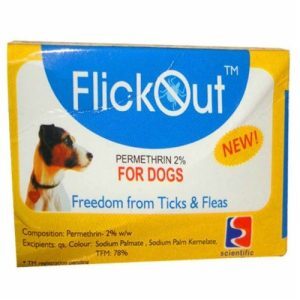Table of Contents
Dog skin problems can range from minor irritations to severe conditions, such as dermatitis, allergies, hot spots, or fungal infections. If left untreated, these issues can lead to discomfort, itching, pain, and even more severe complications. Timely treatment is crucial because it helps alleviate the dog’s discomfort, prevents the problem from worsening, and promotes faster healing. Untreated skin problems can lead to self-inflicted injuries, hair loss, bacterial infections, and reduced quality of life for the dog. Additionally, some skin conditions may indicate underlying health issues that require attention for the pet’s overall well-being. Regular veterinary check-ups and proper care can help identify and treat these problems effectively.
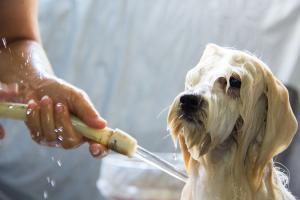
How to Take Care About Dog’s Skin?
Caring for a dog’s skin is essential for their health and well-being. Brushing your dog’s coat regularly helps remove loose hair, dirt, and debris, which can contribute to skin issues. It promotes good circulation and distributes natural oils throughout the skin and coat.
Bathe your dog as needed using a mild, dog-specific soap or shampoo. Overbathing can strip the skin of natural oils, so find a balance based on your dog’s breed and activity level. Always dry your dog thoroughly after a bath to prevent moisture-related skin problems. Regularly inspect your dog’s skin for ticks, fleas, and other parasites. Use preventive measures recommended by your veterinarian to protect your dog from infestations.
A proper diet rich in essential nutrients, vitamins, and minerals is crucial for maintaining healthy skin. Consult your veterinarian to determine the best diet for your dog’s needs. Ensure your dog has access to clean and fresh water at all times. Proper hydration is essential for healthy skin and overall well-being.
Avoid using human skincare products on your dog, as they may contain harmful ingredients. Choose dog-specific skincare products, such as soaps, shampoos, conditioners, and moisturizers, to avoid irritation.
Just like humans, dogs can get sunburned. Provide shade and limit your dog’s exposure to the sun, especially during peak hours.
Schedule regular visits to the veterinarian to monitor your dog’s skin health and address any issues promptly. If your dog shows signs of allergies, such as excessive itching or redness, work with your veterinarian to identify and manage the triggers, such as food, environmental factors, or other allergens. They will prescribe the best soap for dogs with allergies.
Following these tips can help maintain your dog’s skin in good condition, preventing various skin problems and ensuring a happy and healthy furry companion.
Should You Use Soap for Dogs?
You should use soap specifically formulated for dogs. Dog soaps are designed to be gentle on their skin and maintain the natural oils and pH balance. Using human soap can disrupt their skin’s pH, leading to irritation and other issues. Dog-specific soaps effectively cleanse their fur, remove dirt, and leave them fresh. It ensures their safety by avoiding harmful ingredients present in human soaps. Regular use of dog soap promotes a clean and healthy coat, reducing the risk of matting and tangling.
Vet’s Proved Recommendations on How to Choose Soap for Your Dog
When choosing soap for your dog, follow the veterinarian’s recommendations, considering the following factors.
Soap Type Depending on the Breed
Different dog breeds have varying skin and coat characteristics. Some may have sensitive skin, while others require specific grooming needs. Choose a soap that suits your dog’s breed and individual requirements.
Purpose
Consider the specific purpose of the soap. Is it for general cleaning, addressing a skin condition, flea and tick control, or medicated use? Select a soap that aligns with your dog’s needs.
Ingredients
Check the soap’s ingredients carefully. Opt for natural antibacterial soap for dogs and hypoallergenic options to minimize the risk of skin irritation or allergic reactions.
Age
Puppies may have more delicate skin, so choose a mild soap suitable for their age. Likewise, older dogs may have specific skin issues that require targeted solutions.
Scent
Some soaps have fragrances, which may or may not suit your dog’s preference or skin sensitivity. Consider unscented or lightly scented options if your dog is sensitive to strong odors.
Ease of Use
Choose a soap that is easy to apply and rinse off, making bath time less stressful for you and your dog.
Safety for Puppies
Ensure that the soap is safe for use on puppies. Puppies have different requirements than adult dogs; their soap should be gentle and free from harsh chemicals.
What Is the Best Antifungal Soap for Dogs?
Antifungal soaps are not a substitute for veterinary care. If your dog has a fungal infection or skin issue, it’s crucial to consult your veterinarian for a proper diagnosis and treatment plan. They can guide you on the best antifungal soap and any additional treatments required for your dog’s condition. However, antifungal soaps can help you treat fungal infections or skin issues. We recommend Softas Max Soap 75g.
Softas Max Soap, 75g
Intas Softas Max Antifungal Soap is a perfect solution for managing skin infections caused by fungal growth. This specially formulated flea bar soap for dogs relieves your pet from dryness and itching associated with fungal infections. With regular use, it not only alleviates the symptoms but also helps prevent the recurrence of the infection over time.
Active ingredients:
- Permethrin is an active ingredient commonly used in pet products for its insecticidal properties. At a concentration of 2%, it effectively repels and kills ticks, fleas, and other external parasites that may infest dogs and cats. It is widely used in soaps, shampoos, sprays, and spot-on treatments to protect pets from these pests.
- Miconazole nitrate is an antifungal agent used in various topical treatments for fungal infections in pets. At a concentration of 2%, it effectively combats fungal overgrowth on the skin, helping to alleviate itching, redness, and irritation caused by conditions like ringworm and yeast infections. It is commonly found in soaps, shampoos, creams, and ointments for pets suffering from fungal skin issues.
Benefits:
The best anti-itch soap for dogs promotes soft skin and shiny fur while preventing dry skin and fungal infections. This anti-mange soap for dogs effectively relieves your pet of dryness and itching caused by fungal infections and manages skin issues resulting from fungal growth. Please avoid using this product on cats, as the formula contains permethrin, which can be poisonous if swallowed. Keep this gentle soap for dogs out of reach of children and away from consumables, and remember to wash your hands after use. Avoid contact with skin and eyes. This natural flea soap for dogs is intended for animal use only and is unsuitable for humans.
What Is the Best Anti-Tick & Flea Soap for Dogs
Anti-Tick & Flea Soap for dogs prevents and kills ticks and fleas, relieving itching and irritation. It cleans and refreshes the coat, helping prevent secondary infections. It’s easy to apply during bath time and is effective for tick and flea prevention. We suggest Extick Soap 75g, the best flea soap for dogs.
Extick Soap, 75g
The Mankind Pet Extick Anti Tick & Flea Soap 75 gm offers an efficient solution to control fleas and ticks in dogs and cats. Enriched with propoxur, this soap acts as an ectoparasitic, effectively reducing the presence of fleas and ticks. Its convenient application makes it user-friendly. The soap’s gentle cleansing properties are kind to the skin, preventing any potential rashes. Moreover, the unique formula leaves the fur soft and shiny, adding to its overall benefits.
Active Ingredients:
Permethrin: Permethrin is a synthetic insecticide used in pet products to control ticks, fleas, mites, and lice. It disrupts the nervous system of pests, leading to paralysis and death. Proper concentration is crucial for pet safety.
Cetrimide: Cetrimide is an antiseptic and disinfectant compound used in pet soaps and shampoos. It cleanses, removes dirt and excess oils, and prevents bacterial infections. Safe for dogs and cats when used as directed.
Aloe: Aloe is a natural ingredient used in pet soaps and shampoos for its soothing and moisturizing effects. It relieves itching, redness, and dry skin, promoting a healthier coat. Generally safe for dogs and cats, but patch test on sensitive pets.
Benefits:
This product effectively controls fleas and ticks while being gentle on the skin. It is suitable for use on both cats and dogs of all breeds. However, please refrain from using it on lactating or gestating female dogs and puppies younger than four months of age. Remember to store the best soap for dogs with dry skin in a cool dark place for best results.
What is the Best Antibacterial Soap for Dogs
Antibacterial soap for dogs is formulated to combat harmful bacteria that may be present on their skin and coat. It helps reduce the risk of bacterial infections, which can lead to skin irritation and other health issues. By using antimicrobial soap for dogs during bath time, pet owners can promote better hygiene and overall skin health for their fur friends. Regularly using antibacterial soap for dogs can be particularly beneficial for dogs with skin allergies, hot spots, or other conditions prone to bacterial infections. Our choice is FlickOut Soap.
FlickOut Soap 2%, 1mg
FlickOut is a potent solution for flea infestations, offering approximately two months of effectiveness. Against tick infestations, it protects for up to one month. This product’s efficacy is notable even at low doses, acting as an ovicide, larvicide, adulticide, repellent, and feeding suppressor against various ectoparasites.
Active ingredients:
Permethrin is a synthetic insecticide and acaricide belonging to the pyrethroid family. It is commonly used in pet products to control and repel external parasites such as ticks, fleas, mites, and lice. Permethrin disrupts the nervous system of these pests, leading to paralysis and death. It is considered safe for dogs but should be used cautiously on cats, as they can be more sensitive to this chemical.
Benefits:
The soap with permethrin provides effective parasite control, relieving itching and irritation caused by fleas and ticks. This mild antiseptic soap for dogs helps prevent secondary skin infections and promotes better hygiene and cleanliness. Eliminating parasites contributes to the overall health and appearance of the dog’s skin and coat. Additionally, it reduces the risk of vector-borne diseases transmitted by ticks and fleas. Always follow the instructions and consult a veterinarian for specific concerns or health conditions.
How to Make Bar Soap for Dogs?
Making natural bar soap for dogs at home is possible, and some pet owners may choose to do so to ensure they use natural ingredients and avoid harsh chemicals. However, it’s essential to recognize that homemade soap may not offer the same level of effectiveness and safety as commercial pet-specific soaps formulated and tested by experts.
Creating homemade organic bar soap for dogs involves combining natural ingredients such as coconut oil, olive oil, shea butter, essential oils, and other skin-friendly additives. The soap-making process typically includes melting the oils, adding lye, and solidifying the mixture into bars.
While homemade soap can be a fun and creative DIY project, we still recommend commercially produced pet soaps. They are formulated to address specific needs of dogs, such as flea and tick control, allergies, or sensitive skin. Homemade soaps may lack such specialized benefits.
Besides, commercially manufactured pet soaps undergo rigorous testing to ensure quality and safety. Homemade soap lacks the same level of quality control.
For these reasons, it is recommended to use pet-specific soaps that have been specifically formulated and tested for dogs. These products are designed to be safe and effective for pet use, addressing their unique grooming needs and promoting overall skin health.
FAQ
Can You Use Dish Soap for Dog Bathing?
Using dish soap for dog bathing is generally not recommended. Dish soaps are designed for cleaning dishes and are often too harsh for a dog’s sensitive skin. They can strip away natural oils, leading to dryness, itching, and potential skin irritation. It is best to use a soap specifically for dogs to ensure their skin and coat stay healthy.
Is Antibacterial Soap Safe for Dogs?
Antibacterial soap may contain chemicals that can be harmful to dogs if ingested or if they have sensitive skin. While using antibacterial soap occasionally for specific purposes, such as cleaning wounds under veterinary guidance, may be acceptable, it is not recommended for regular dog bathing. Always consult a veterinarian before using any products with antibacterial properties on your dog.
Can I Use Baby Soap for Dogs?
Using baby soap for dogs occasionally may be safe, but reading the label and choosing a soap with mild and natural ingredients is essential. Some baby soaps may be gentle enough for dogs with sensitive skin. However, it’s best to use a soap specifically designed for dogs, as their skin pH and needs differ from those of humans.
Is Johnson Baby Soap Safe for Dogs?
Johnson’s Baby Soap or other baby soaps may be used on dogs occasionally if they have mild and gentle formulations. However, it is not recommended as a regular bathing option. Dogs require products designed specifically for their needs, including skin pH and coat type. Consult a veterinarian before using any new products on your dog.
Can We Use Human Soap for Dogs?
Using human soap for dogs is generally not recommended. Human soaps are formulated for human skin with a different pH level and structure than a dog’s skin. Using human soap on dogs can lead to skin irritation, dryness, and other potential issues. Always use soap designed for dogs to ensure their skin health and overall well-being.

